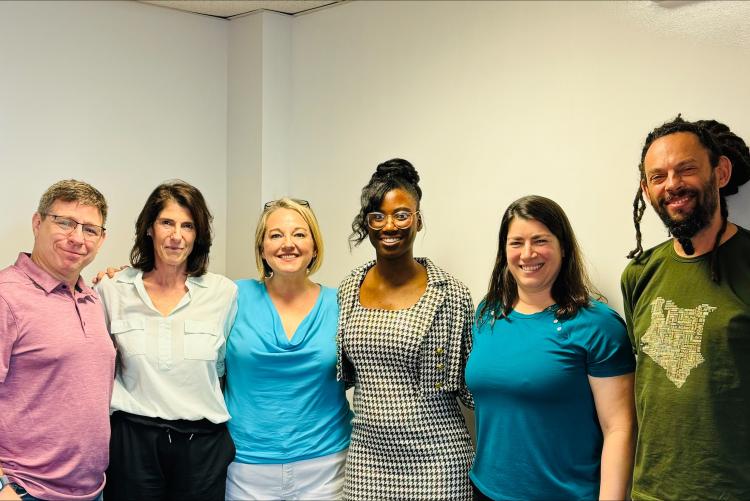JOCHEBED CADET SUCCESSFULLY DEFENDS HER DISSERTATION

Jochebed Cadet (center) pictured standing with faculty of the JHU Sociology Department.
Access to information and support is widely understood as critical for shaping one's opportunities in life. However, the role of emotion in determining how individuals seek information and support, particularly in unfamiliar environments, is often overlooked. Drawing from 68 interviews with first generation college students, I investigate how first-generation college students gain the information and support they are said to be missing to navigate the challenges of post-secondary institutions.
I find that students often felt a lack of understanding from their parents, who failed to empathize with the challenges of college life, such as workload stress and navigating the grading system. As a result, despite discussing their school experiences with their parents, these conversations often remained limited, superficial and selective. In efforts to rectify some of the missing information they lacked, I discovered that first-generation college students adopted varied help-seeking strategies, shaping how they sought information and support during college. Some employed a proactive community engagement approach, actively seeking assistance from their communities. In contrast, over half relied on a solo strategy, refraining from seeking external support. Those who embraced self-reliance often equated it with academic excellence. These strategies influenced how students discussed school-related stress; students who used the community engagement strategy were less likely to feel overwhelmed, while those who avoided seeking help felt isolated and stressed.
Further, I find that students rely on knowledge and empathy when determining who to seek help from in college. I introduce a framework of four different categories of individuals from whom first generation college students might seek information and support from. While students engage with individuals from all categories, many offered limited assistance. The most valuable were the empathic experts, highly knowledgeable and empathetic individuals. Students sought them out because of their ability to relate to them and provide holistic support. However, the effectiveness of students' efforts remains unclear; some may succeed while others may receive inaccurate information. Moreover, focusing solely on knowledgeable and empathetic individuals may overlook other important factors, such as reliability and number of resources. Together, these findings challenge ideas about how people find information and support in new contexts and the importance of emotion in the process of social mobility.
- Log in to post comments